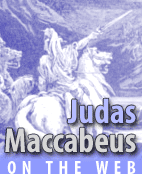
Religious and Political Meaning
Jewish | Christian | Unitarian | Political
Jewish
"A Hanukkah Message for Today" by Rabbi Irving Greenberg (Beliefnet). Nicely reviews how different ages have seen Hanukkah, focusing in turn on messianic expectation, state foundation, and religious freedom—the latter requiring some cortortions. The author settles on the necessity of Jewish particularism.
"Universalism must surrender its overweening demands and accept the universalism of pluralism."
"One People, Many Stories" by Rabbi Brad Hirschfield (Beliefnet) calls on Jews to reject interpretations based on the dangers of assimilation.
"On a holiday that reminds us, among many things, of the danger of idolatry, we dare not turn Jewish identity into an idol."
"Globilization and the Maccabees" by Rabbi Margaret Holub (January 2001). As Rabbi Holub explains, for Reform Jews the story of the Maccabean Revolt can be troubling:
"While the rabbinic tradition comes down squarely on the side of the traditional folk, so that we celebrate the Maccabees' victory over the hellenizing Jews, the truth is that, if an analogous conflict were happening today, many of us would probably be pretty ambivalent at best. So Hanukkah always presents a problem: were the Maccabees in fact heroes, or were they the taliban of their time? Should we be cheering or mourning their victory? I'm sure I've quoted to you at some time or another the startling analogy I heard years ago from Rabbi Jim Ponet, who said that that Maccabean revolt was like a busload of black coated fundamentalists with machine guns laying siege on Hebrew Union College (the Reform seminary where I was studying to become a rabbi.)"Holub goes on to find reassurance in a parallel the Maccabean fight against Hellenization and her opposition to globalization.
"Behaving Like Maccabees" by Judy Gruen (Beliefnet). Jewish inspiration about the meaning of Hanukkah in the modern world.
"When I sit and watch those flickering flames, I am strengthened by the memory of my ancestors who fought for our faith — and were rewarded by miracles."
From the Rabbi (Rabbi Harry A. Manhoff). Meditation on Hanukkah and violence, with an interesting point to make:
"In the end, the rabbis did not want to celebrate the military victory of the Maccabees. They created the story of the miracle of the oil to take the spotlight off of the war, and to refocus it on the Temple and the religious life of our people."
"Hanukkah's Big Test" by Rabbi Irving Greenberg (author of "A Hanukkah Message for Today" above), a more traditional understanding of Hanukkah as a "paradigm of the relationship between acculturation end assimilation."
"Hanukkah dramatizes the positive strength of Pietism, of Chasidism's unquestioning loyalty to Judaism. It challenges modern Jews to review their own easy acceptance of cosmopolitanism and sophisticated culture as superior to the sentiment and tribal feeling of being Jews. It asks whether, consciously or unconsciously, modern Jews are part of the Hellenizing, assimilating majority."
Hanukkah Heroines: Antidotes to the male-dominated story of Hanukkah" by Jonathan Groner (Beliefnet). I was looking forward to how Groner was going to find heroines in the Maccabees story. Instead, she presents a nice summary and meditation on the Book of Judith, roughly contemporary with the Maccabean revolt.
Beliefnet: A Great Miracle Happened. Hanukkah page with lots of useful articles and features, the best of which are below.
Best of the Web: Chanukah Resources compiled by the Jewish Agency for Israel. Detailed list.
Christian
I have failed to find much in the way of Christian sermons on Judas Maccabeus and Hannukah. This may be due to the fact that 1 and 2 Maccabees are considered extra-canonical by many Protestants, and are certainly so for the American evangelicals who dominate the web. That said, there must be material out there. If you find some, let me know at [email protected].
"Violent Night, Holy Night: The Apocrypha tells us about the brutal and seductive world Jesus was born into" by Tim Stafford, Christianity Today December 9, 2002
"Light Breaks Forth" by Bishop John Shelby Spong (Beliefnet), locating similarities between the two holidays. But does stressing "light" do justice to either? Rather than the defense of Jewish particularism against pagan syncretism or the unique message of Jesus' birth, Spong finds in both holidays the notion that that "religious truth, like all truth, emerges out of human experience." I have some objections.[1]
Unitarian
Unlike all Protestant denominations of which I am aware Unitarians regularly and explicitly commemorate Hanukkah. There are quite a few Unitarian Universalist Hanukkah sermons online.
"Light One Candle" by Beverly M. Boke (December 9, 2001), Four Corners, VT . Boke explicitly compares the Maccabees and Al Qaeda, asking "But don't Al Qaeda members wish to save the world, by their own lights?" I am simply aghast at the closing paragraph:
"I know what behaviors I consider to be criminal. I know what I think is heroic. And I know after years of working against war and violence, and for human rights, that we are in a situation where heroes and criminals walk in each others' shadows, and sometimes overlap. It all depends on your point of view."
"Don't Let the Light Go Out!" by Barbara Wells, Adelphi, Maryland (Dec. 16, 2001). Wells graples with the paradox that while Unitarians commonly appreciate Hanukkah for its themes of religious tolerance, it also commemorates a bloody civil war fought by Jews "strict and harsh in their religious beliefs."
"Rock of Ages" by Evan Keely (Nov. 1999), Milton, MA.
"I am aware that this morning's lesson is a challenging one. It's hard for religious liberals to feel comfortable when the violent history of the ancient world is retold in a manner that is exalted as holy scripture. When we look at this passage from 1 Maccabees, we might well wonder if we would be better off as a civilization if we did not give such a place of pride to ancient stories that seem to glorify acts of violence. "
"The Fire of Freedom" by Rev. R. Paul Mueller, a sermon given at The Unitarian Society of New Brunswick (Dec. 8, 106)
"The Maccabean Spirit" by Rev. Ricky Hoyt, Unitarian (Santa Clarita, CA).
"What do we do when we affirm, say, total non-violence as our action strategy, and someone else affirms, or requires of us as citizens of a nation, violent action either as self-defense, or as pre-emptive war? What do we do when our values demand laws that ban guns or provide universal health care and the actual laws passed by our legislature allow guns in our community and don't provide health care to all? That's the question of Hanukkah."
Other UU Hanukkah sermons: Mark Belletini (Columbus, Ohio), Tom Howard (Summit NJ), with unqualified likening to the Taliban,
Political
"Seattle Protesters Were Like Judah Maccabee" by Michael Lerner, editor of Tikkun, on WTO protests and globalization.
Notes:
- There's much to this idea—it should give us some humility and call us to involvement in the process—but does it really call us to be hostile to truth once it's emerged? And where does this lead Spong? Well, I was exceptionally irritated by this paragraph:
"It is time to recognize that religious truth, like all truth, emerges out of human experience. Once that is understood, then religious people will recognize that their exclusive claim to possess divine revelation is nothing but a part of our human security system. Those claims create the mentality that fuels religious imperialism."
According to Spong, therefore, Bin Laden's problem is strong religious opinions, not evil ones. Ending up there is particularly odd in that the Maccabean Revolt was, like Bin Laden's war, a true religious war—perhaps the first. More generally, Spong's argument remind me of Falwell's statement that 9/11 was God's punishment for American gays, feminists and the ACLU. Of course, the substance is exactly opposite: Falwell's a conservative Christian, Spong a liberal one. But their argumentative opportunism and lack of humility is identical. Both show the same eagerness to explain 9/11 as the confirmation of their previously-formed opinion. This horrible, shattering event didn't knock Falwell and Spong off their line: "it's homosexuality!" or "it's strong religious conviction!" (back)
"That was a major learning out of the tragedy of Sept. 11."

All material © 2000–2004 Tim Spalding. Books presented in association with Amazon.com.
If you enjoy this site you may like these others by me:
Cleopatra on the Web. Everything about Cleopatra VII of Egypt, in history ad the Western imagination.
Hieroglyphics! Comprehensive guide to Egyptian hieroglyphics.